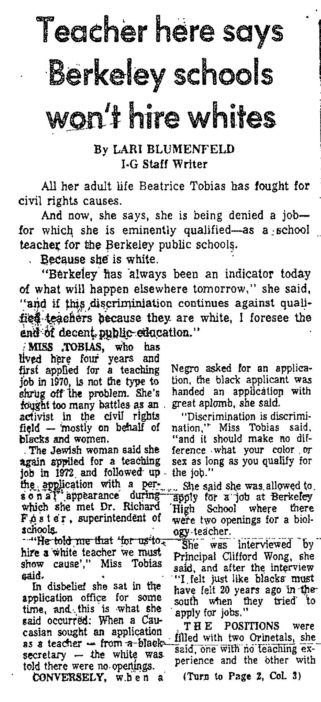In this Berkeley Daily Gazette article, Beatrice Tobias is positioned “as an activist in the civil rights field–mostly on the behalf of blacks and women,” who is now experiencing discrimination because of affirmative action hiring policies of the district.
According to Tobias, in a 1972 meeting with Superintendent Richard Foster, she was told that “for us to hire a white teacher we must show cause,” recounting a second instance in which she sat in the application office and observed that “when a Caucasian sought an application as a teacher–from a black secretary–the white was told there were no openings. Conversely, when a Negro asked for an application, the black applicant was handed an application with great aplomb.”
While competing for a job as a biology teacher at Berkeley High, Tobias left an interview with Principal Clifford Wong with the following thought: “I felt just like blacks must have felt 20 years ago in the south when they tried to apply for jobs,” the article going on to say that, according to Tobias, “the positions [at Berkeley High] were filled with two Orientals…one with no teaching experience and the other 1.5 years of experience.”
After this experience, Tobias filed a complaint with the Fair Employment Practices Commission in San Francisco, receiving a letter weeks later saying that the commission would not pursue her complaint.
Tobias took her case to Berkeley Neighborhood Legal Services, who accepted it and planned to file suit a week after the publication of this article.
“The children suffer the most when qualified teachers are not hired,” Tobias said, the article ending with the declaration: “I’m not going to sit back and see the white race denied its right to work.”
While this article does not speak to the experience of white teachers directly, given that Tobias wasn’t hired, it nonetheless captures the frustration many white teachers felt, rightly or wrongly, about the shifting hiring priorities of the school district, an internal tension that lay beneath the 1975 strike.
